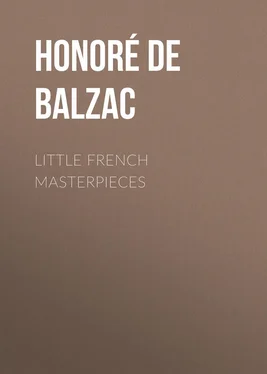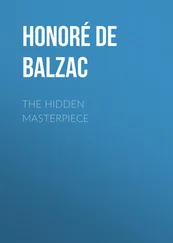Honoré Balzac - Little French Masterpieces
Здесь есть возможность читать онлайн «Honoré Balzac - Little French Masterpieces» — ознакомительный отрывок электронной книги совершенно бесплатно, а после прочтения отрывка купить полную версию. В некоторых случаях можно слушать аудио, скачать через торрент в формате fb2 и присутствует краткое содержание. Жанр: foreign_antique, foreign_prose, на английском языке. Описание произведения, (предисловие) а так же отзывы посетителей доступны на портале библиотеки ЛибКат.
- Название:Little French Masterpieces
- Автор:
- Жанр:
- Год:неизвестен
- ISBN:нет данных
- Рейтинг книги:5 / 5. Голосов: 1
-
Избранное:Добавить в избранное
- Отзывы:
-
Ваша оценка:
- 100
- 1
- 2
- 3
- 4
- 5
Little French Masterpieces: краткое содержание, описание и аннотация
Предлагаем к чтению аннотацию, описание, краткое содержание или предисловие (зависит от того, что написал сам автор книги «Little French Masterpieces»). Если вы не нашли необходимую информацию о книге — напишите в комментариях, мы постараемся отыскать её.
Little French Masterpieces — читать онлайн ознакомительный отрывок
Ниже представлен текст книги, разбитый по страницам. Система сохранения места последней прочитанной страницы, позволяет с удобством читать онлайн бесплатно книгу «Little French Masterpieces», без необходимости каждый раз заново искать на чём Вы остановились. Поставьте закладку, и сможете в любой момент перейти на страницу, на которой закончили чтение.
Интервал:
Закладка:
Honoré de Balzac
Little French Masterpieces
INTRODUCTION
Balzac's short stories, which we call in French nouvelles are, generally speaking, not the best-known or the most popular part of his work; nor are they the part best fitted to give a true and complete idea of his genius. But some of them are none the less masterpieces in their kind; they have characteristics and a significance not always possessed by their author's long novels, such as Eugénie Grandet or Cousin Pons; and finally, for this very reason, they hold in the unfinished structure of The Human Comedy a place which it will be interesting to try to determine. That is all that will be attempted in this Introduction.Some of the stories contained in the present volume were written under curious circumstances. In the first place it is to be noted that they all date from 1830, 1831, and 1832 1 1 According to Lovenjoul, A Seashore Drama was first published in the fourth edition of the Philosophic Studies , in 1835. But this fact in no wise lessens the force of M. Brunetière's argument. – Ed.
and therefore precede the conception and planning of The Human Comedy . Their value is far from being diminished by that fact. An Episode under the Terror (1830), for instance, was composed as an introduction to the Memoirs of Sanson – that executioner who of all executioners in the world's history probably despatched the fewest criminals and yet shed the most blood; and the Memoirs themselves, which are entirely apocryphal, are also in part Balzac's own work. But, though composed in this way, to order and as a piece of hack work, An Episode under the Terror is in its artistic brevity one of Balzac's most tragic and most finished narratives. La Grande Bretèche (1832) was at first only an episode inserted among the more extended narratives of which it made part, as in the old-fashioned novel of tales within tales of which Gil Blas is the type; and brief as it is, Balzac nevertheless rewrote it three or four times. It is therefore anything but an improvisation. Yet no other of these short stories can give more vividly than La Grande Bretèche the impression of a work sprung at once in full completeness from its author's brain, and conceived from the very first in its indivisible unity. But, precisely, it is one of the characteristic traits of Balzac's genius that we hardly need to know when or for what purpose he wrote this or that one of his novels or stories. He bore them all within him at once – we might say that the germ of them was preëxistent in him before he had any conscious thought of objectivising them. His characters were born in him, as though from all eternity, before he knew them himself; and before he himself suspected it, The Human Comedy was alive, was confusedly moving, was slowly shaping itself, in his brain. This point must be clearly seen before he can be understood or appreciated at his true value. However much interest a monograph on some animal or plant may have in itself – and that interest, no doubt, is often great – it has far more through the relations it bears to other monographs and to the whole field of knowledge of which its subject is only a fragmentary part. So it is with Balzac's novels and stories. Their interest is not limited to themselves. They bring out one another's value and significance, they illustrate and give importance to each other; they have, outside themselves, a justification for existence. This will become clear if we compare Mérimée's Mateo Falcone ; for instance, with A Seashore Drama (1835). The subject is the same: in each case it is a father who constitutes himself justiciary of the honour of his race. But while Mérimée's work, though perhaps better written or at least engraved with deeper tooling, is after all nothing but an anecdote, a sensational news-item, a story of local manners, Balzac's is bound up with a whole mass of ideas, not to say a whole social philosophy, of which it is, properly speaking, only a chapter; and of which The Conscript (1831) is another.
But why did Balzac confine some of his subjects within the narrow limits of the nouvelle , while he expanded others to the dimensions of epic, we might say, or of history? It was because, though analogies are numerous between natural history and what we may call social history or the natural history of society, yet their resemblance is not complete nor their identity absolute. There are peculiarities or variations of passion which, though physiologically or pathologically interesting, are socially insignificant and can be left out of account: for instance, A Passion in the Desert (1830), or The Unknown Masterpiece (1831). It is rare, in art, for the passionate pursuit of progress to result only, as with Frenhofer, in jumbling the colours on a great painter's canvas; and, even were this less rare, artists are not very numerous! So, if the writer gave to his narrative of this painful but infrequent adventure as full a development, if he diversified and complicated it with as many episodes and details as the adventures of Baron Hulot in Cousin Bette or those of Madame de Mortsauf in The Lily in the Valley , he would thereby attribute to it, socially or historically , an importance it does not possess. He would err, and would make us err with him, regarding the true proportions of things. He would represent the humanity which he was attempting to depict, in a manner far from consistent with reality. Hence may be deduced the æsthetics of the nouvelle , and its distinction from the conte , and also from the roman or novel.
The nouvelle differs from the conte in that it always claims to be a picture of ordinary life; and it differs from the novel in that it selects from ordinary life, and depicts by preference and almost exclusively, those examples of the strange, the rare, and the extraordinary which ordinary life does in spite of its monotony nevertheless contain. It is neither strange nor rare for a miser to make all the people about him, including his wife and children, victims of the passion to which he is himself enslaved; and that is the subject of Eugénie Grandet . It is nothing extraordinary for parents of humble origin to be almost disowned by their children whom they have married too far above them, in another class of society; and that is the subject of Father Goriot . But for a husband, as in La Grande Bretèche , to wall up his wife's lover in a closet, and that before her very eyes; and, through a combination of circumstances in themselves quite out of the ordinary, for neither one of them to dare or be able to make any defence against his vengeance – this is certainly somewhat rare! Then read The Conscript , or An Episode under the Terror; the plot is no ordinary one, and perhaps, with a little exaggeration, we may say it can have occurred but once. Such, then, is the field of the nouvelle . Let us set off from it the fantastic, in the style of Hoffmann or Edgar Allan Poe, even though Balzac sometimes tried that also, as in The Wild Ass's Skin , for instance, or in Melmoth Converted; for the fantastic belongs to the field of the conte . But unusual events, especially such as result from an unforeseen combination of circumstances; and really tragic adventures, which, like Monsieur and Madame de Merret's in La Grande Bretèche or Cambremer's in A Seashore Drama , make human conscience hesitate to call the crime by its name; and illogical variations, deviations, or perversions of passion; and the pathology of feeling, as in The Unknown Masterpiece; and still more generally, if I may so express myself, all those things in life which are out of the usual run of life, which happen on its margin , and so are beside yet not outside it; all that makes its surprises, its differences, its startlingness , so to speak – all this is the province of the nouvelle , bordering on that of the novel yet distinct from it. Out of common every-day life you cannot really make nouvelles , but only novels – miniature novels, when they are brief, but still novels. In no French writer of the last century, I think, is this distinction more evident or more strictly observed than it is in The Human Comedy; and unless I am much mistaken, this may serve to solve, or at least to throw light on, the vexed question of Honoré de Balzac's naturalism or romanticism .
Читать дальшеИнтервал:
Закладка:
Похожие книги на «Little French Masterpieces»
Представляем Вашему вниманию похожие книги на «Little French Masterpieces» списком для выбора. Мы отобрали схожую по названию и смыслу литературу в надежде предоставить читателям больше вариантов отыскать новые, интересные, ещё непрочитанные произведения.
Обсуждение, отзывы о книге «Little French Masterpieces» и просто собственные мнения читателей. Оставьте ваши комментарии, напишите, что Вы думаете о произведении, его смысле или главных героях. Укажите что конкретно понравилось, а что нет, и почему Вы так считаете.












